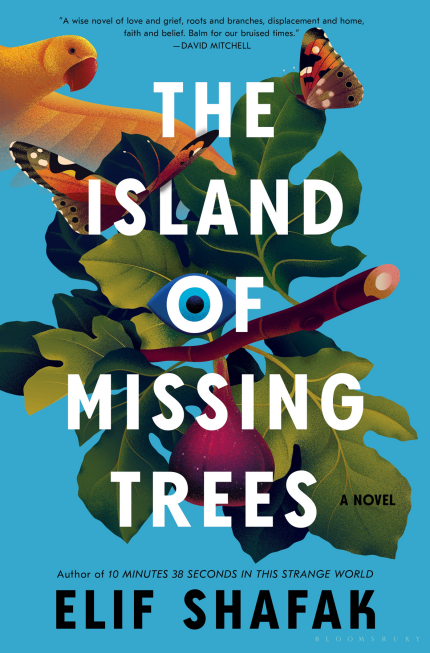The Island of Missing Trees, by Elif Shafak

The Island of Missing Trees by Elif Shafak
My rating: 5 of 5 stars
»In the most surprising ways, the victims continued to live, because that is what nature did to death, it transformed abrupt endings into a thousand new beginnings.«
I’ve absolutely no idea now “The Island of Missing Trees” by Elif Shafak made it on my to-be-read list but, wow, am I glad it did! I wanted to embrace it.
I was, of course, aware of the conflict about the Mediterranean island of Cyprus but, like so many other conflicts, I had a basic intellectual understanding of it. What this novel added is the perspective of two young lovers: Defne is a Turkish Cypriot and Kostas a Greek Cypriot. Both grow up in the capital, Nicosia, where they meet and, ultimately, deeply fall in love with each other.
»‘I missed you,’ she said.
In that moment Kostas Kazantzakis knew the island had pulled him into its orbit with a force greater than he could resist and he would not return to England any time soon, not without her by his side.«
This is not a romance, though; it is far from it although including elements of one. Most of all we get a close look at the fate of one family, Defne, Kostas and their child, Ada. Also playing an important role is a fig tree that once flourished in a bar on Cyprus which served as Defne’s and Kostas’ safe haven in an environment that would condemn their love for each other purely because of their respective nationality and religion – despite primarily being islanders.
»Christian cannot marry a Muslim, it offends the eyes of Our Lord.«
(There is no god but this – and much worse – is what you get for believing in one.)
We accompany our cast from Cyprus in 1974 to London in the late 2010s. The novel opens in London and we get to know that Defne has died, Kostas has retreated into his work, his memories and himself. Ada, their child, is struggling at school and with life in general – where does she come from? What are her roots and what about her extended family – because there was no one around for Defne’s funeral.
»[Ada] knew in her gut that she was the child of the type of love that rose from the bottom of the ocean, from a blue so dark it was almost black.«
From this premise, we switch between the past (mostly 1974 in Cyprus), the present (the late 2010s in London) and the early 2000s in Cyprus. The narration is broken up by the unlikely interjections of the fig tree mentioned earlier. These parts often connect (and sometimes reconcile) the past with the present and add important additional aspects from an uncommon but entirely sensible perspective.
»’I disagree,’ said Defne into her wine glass. ‘There are moments in life when everyone has to become a warrior of some kind. If you are a poet, you fight with your words; if you are an artist, you fight with your paintings … But you can’t say, “Sorry, I’m a poet, I’ll pass.” You don’t say that when there’s so much suffering, inequality, injustice.’«
I have to admit, I was irritated by the fig tree’s appearances at first but after intentionally suspending judgement on this issue, I was quickly and completely gripped by this wonderful story. In fact, this was the first book in a long time that made me read deep into the night. Whereas I was, at first, hesitant to pick this book up again, the more I read the more hesitant I became to put it down.
I also very much enjoyed the way Shafak weaved together the personal and the political. She shows how the conflicts that have ravaged Cyprus over the years have had a profound impact on the lives of its people, and how the wounds of the past continue to shape the present. At the same time, she also shows how individuals can make a difference, even in the face of seemingly insurmountable challenges.
What sets this book apart is the tenderness of its narration. While I read it, I also felt the joy, the pain and so many other emotions that were not even told but pretty much triggered. And while there’s a lot of sadness to be felt here (I’m actually crying right now), the primary subject here is love and it permeates the book.
I especially liked sharp-tongued, quick-witted and struggling Ada who begins healing by interacting with her aunt Meryem. Her obvious intelligence coupled with her deep empathy made her struggles all the more challenging to read.
»Ada stopped asking questions then, not because she agreed with anything her aunt said but because she had sensed, once again, underneath all the spirited talk and assertive personality, how timid and vulnerable the woman really was.«
Everyone from our protagonists to their friends Yiorgos and Yusuf, the gay couple owning the bar in which so many important incidents happen, down to their parrot Chico, feels like a believable, plausible being.
Another aspect of the book that I particularly appreciated was the way Shafak used nature as a metaphor for the human experience: The island itself, with its beautiful landscapes and diverse ecosystems, is a character in its own right, and serves as a powerful reminder of the interconnectedness of all things.
Or, as Shafak puts it: »I also wanted to honour local folklore and oral traditions. But everything here is fiction – a mixture of wonder, dreams, love, sorrow and imagination.«
At that, she utterly, completely succeeded.
These are the easiest five out of five stars I’ve awarded this year so far!
Ceterum censeo Putin esse delendam
View all my reviews